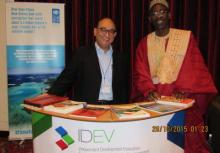The East African Development Bank (EADB) is a sub-regional development bank owned by the three member states of Kenya, Uganda and Tanzania. Other shareholders include the African Development Bank, bilateral donors and some foreign banks. EADB was established in 1967 under the Treaty of East African Cooperation. Following the Cooperation’s break up in 1977, EADB was re-established in 1980 under its own charter and mandated to offer a broad range of financial services to small and medium enterprises (SMEs), guided by the overriding objective of promoting socio-economic development and regional integration in the member states.



